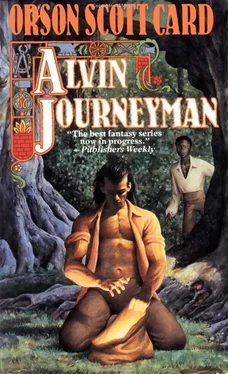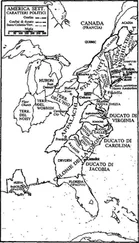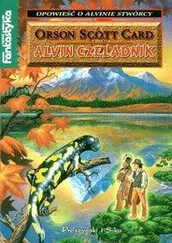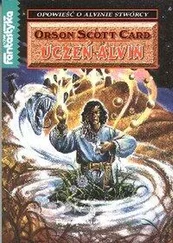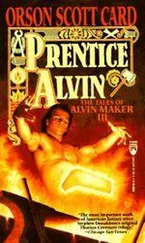Orson Card - ALVIN JOURNEYMAN
Здесь есть возможность читать онлайн «Orson Card - ALVIN JOURNEYMAN» весь текст электронной книги совершенно бесплатно (целиком полную версию без сокращений). В некоторых случаях можно слушать аудио, скачать через торрент в формате fb2 и присутствует краткое содержание. Жанр: Фантастика и фэнтези, на английском языке. Описание произведения, (предисловие) а так же отзывы посетителей доступны на портале библиотеки ЛибКат.
- Название:ALVIN JOURNEYMAN
- Автор:
- Жанр:
- Год:неизвестен
- ISBN:нет данных
- Рейтинг книги:3 / 5. Голосов: 1
-
Избранное:Добавить в избранное
- Отзывы:
-
Ваша оценка:
- 60
- 1
- 2
- 3
- 4
- 5
ALVIN JOURNEYMAN: краткое содержание, описание и аннотация
Предлагаем к чтению аннотацию, описание, краткое содержание или предисловие (зависит от того, что написал сам автор книги «ALVIN JOURNEYMAN»). Если вы не нашли необходимую информацию о книге — напишите в комментариях, мы постараемся отыскать её.
ALVIN JOURNEYMAN — читать онлайн бесплатно полную книгу (весь текст) целиком
Ниже представлен текст книги, разбитый по страницам. Система сохранения места последней прочитанной страницы, позволяет с удобством читать онлайн бесплатно книгу «ALVIN JOURNEYMAN», без необходимости каждый раз заново искать на чём Вы остановились. Поставьте закладку, и сможете в любой момент перейти на страницу, на которой закончили чтение.
Интервал:
Закладка:
"What's your price?"
"When you get free of this place, you let me go with you, to learn from you, to watch you, to be part of all you do."
"You don't even know me, and you're proposing marriage."
Verily laughed. "I suppose it sounds like that, doesn't it."
"Without none of the benefits, neither," said Alvin. "I'm right comfortable taking Arthur Stuart along with me, because he knows when to keep silent, but I don't know if I can take having a fellow who wants to pick my brains tagging along with me every waking minute."
"I'm a lawyer, so my trade is talk, but I promise you that if I didn't know when and how to keep silence, I'd never have lived to adulthood in England."
"I can't give you no promises," said Alvin. "So I reckon you ain't my attorney after all, since I can't make your fee."
"There's one promise you can make me," said Verily. "To give me an honest chance."
Alvin studied the man's face and decided he liked the look of him, though he wished as more than once before that he had Peggy's knack of seeing inside a fellow's mind instead of just being able to check out the health of his organs.
"Yes, I reckon I can make that promise, Verily Cooper," said Alvin. "An honest chance you'll have, and if that's fee enough for you, then you're my attorney."
"Then the deed is done. And now I'll let you go back to sleep, excepting only for one question."
"Ask it."
"This plow—how vital is it to you that the plow remain in your hands, and no one else's?"
"If the court demands that I give it up, I'll buck this jail and live in hiding the rest of my days before I'll let any other hand touch the plow."
"Let's be precise. Is it the possession of it that matters, or the very seeing and touching of it?"
"I don't get your question."
"What if someone else could see and touch it in your presence?"
"What good would that do?"
"Webster will argue that the court has the right and duty to determine that the plow exists and that it's truly made of gold, in order to make just compensation possible, if the court should determine that you need to pay Mr. Makepeace Smith the cash value of the plow."
Alvin hooted. "It never crossed my mind, in all this time in jail, that maybe I could buy old Makepeace off."
"I don't think you can," said Verily. "I think it's the plow he wants, and the victory, not the money."
"True enough, though I reckon if the money's all he can get..."
"So tell me, as long as the plow is in your possession..."
"I guess it depends on who's doing the looking and the touching."
"If you're there, nobody can steal it, am I right?" asked Verily.
"Reckon that's true," said Alvin.
"So how free a hand do I have?"
"Makepeace can't be the one to touch it," said Alvin. "Not out of any meanness on my part, but here's the thing: The plow's alive."
Verily raised an eyebrow.
"It don't breathe and it don't eat or nothing like that," said Alvin. "But the plow is alive under a man's hand. Depending on the man. But for Makepeace to touch the plow while he's living in the midst of a black lie—I don't know what would happen to him. I don't know if it'd be safe for him ever to touch metal again. I don't know what the hammer and anvil would do to him, if his hands touched the plow with his heart so black."
Verily leaned his face against the bars, closed his eyes.
"Are you unwell?" asked Alvin.
"Sick with the thrill of at last staring knowledge in the face," said Verily. "Sick with it. Faint with it."
"Well, don't puke on the floor, I'll have to smell it all night." Then Alvin grinned.
"I was thinking more of fainting," said Verily. "Not Makepeace, or anyone else who's living in a... black lie. Makes me wonder about my opponent, Mr. Daniel Webster."
"Don't know him," said Alvin. "Might be an honest man, for all I know. A lying man might have an honest attorney, don't you think?"
"He might," said Verily. "But such a combination would only work to destroy the lying man in the end."
"Well hell, Verily, a lying man destroys himself in the end every time anyway."
"Do you know that? I mean, the way you know the plow is alive?" asked Verily.
"I reckon not," said Alvin. "But I have to believe it's true, or how could I trust anybody?"
"I think you're right, in the long run," said Verily. "In the long run, a lie ties itself in knots and eventually people come to see that it's a lie. But the long run is very, very long. Longer than life. You could be long dead before the lie dies, Alvin."
"You warning me of something in particular?" asked Alvin.
"I don't think so," said Verily. "The words just sounded like something I had to say and you had to hear."
"You said them. I heard them." Alvin grinned. "Good night, Verily Cooper."
"Good night, Alvin Smith."
Peggy Larner got to the ferry bright and early in the morning, wearing her urgency like a tight corset so she could hardly breathe. White Murderer Harrison was going to be president of the United States. She had to talk to Alvin, and this river, this Hio, was standing in her way.
But the ferry was on the other side of the river, which made perfect sense, since the farmers on the other side would need to have it earliest, to bring their goods to market. So she had to wait, urgency or not. She could see the ferry already being poled along, tied to a metal ring that slid along the cable that crossed the river some forty feet overhead. Only that frail connection kept the whole thing from being washed downriver, and she imagined that when the river was in flood they didn't run the ferry at all some days, since even if the cable were strong enough, and the ring, and the rope, there'd be no trees strong enough to tie the ends to without fear of one or the other of them pulling out of the ground. Water was not to be tamed by cables, rings, or ropes, any more than dams or bridges, hulls or rafts, pipes or gutters, roofs or windows or walls or doors. If she had learned anything in her early years of looking out for Alvin, it was the untrustworthiness of water, the sneakiness of it.
There was the river to be crossed, though, and she would cross it.
As so many others had crossed. She thought of how many times her father had snuck down to the river and taken a boat across to rescue some runaway slave and bring him north to safety. She thought of how many slaves had come without help to this water, and, not knowing how to swim, had either despaired and waited for the Finders or the dogs to get them, or struck out anyway, breasting the water until their feet found no purchase on the bottom mud and they were swept away. The bodies of such were always found on some downriver bank or bar or snag, made white by the water, bloated and horrible in death; but the spirit, ah, the spirit was free, for the owner who thought he owned the woman or the man, that owner had lost his property, for his property would not be owned whatever it might cost. So the water killed, yes, but just reaching this river meant freedom of one kind or another to those who had the courage or the rage to take it.
Harrison, though, would take away all meaning from this river. If his laws came to be, the slave who crossed would still be a slave no matter what; only the slave who died would be free.
One of the ferrymen, the one poling on this side, he looked familiar to her. She had met him before, though he'd not been missing an ear then, nor had he any kind of scar on his face. Now a gash marked him with a faint white line, a little puckering and twisting at the eyebrow and the lip. It had been a wicked fight. Once no one had been able to lay a hand of harm on this rough man, and in the sure knowledge of that he had been a bully. But someone took that lifelong hex away from him. Alvin had fought this man, fought him in defense of Peggy herself, and when the fight was, done, this river rat had been undone. But not completely, and he was alive still, wasn't he?
Читать дальшеИнтервал:
Закладка:
Похожие книги на «ALVIN JOURNEYMAN»
Представляем Вашему вниманию похожие книги на «ALVIN JOURNEYMAN» списком для выбора. Мы отобрали схожую по названию и смыслу литературу в надежде предоставить читателям больше вариантов отыскать новые, интересные, ещё непрочитанные произведения.
Обсуждение, отзывы о книге «ALVIN JOURNEYMAN» и просто собственные мнения читателей. Оставьте ваши комментарии, напишите, что Вы думаете о произведении, его смысле или главных героях. Укажите что конкретно понравилось, а что нет, и почему Вы так считаете.
